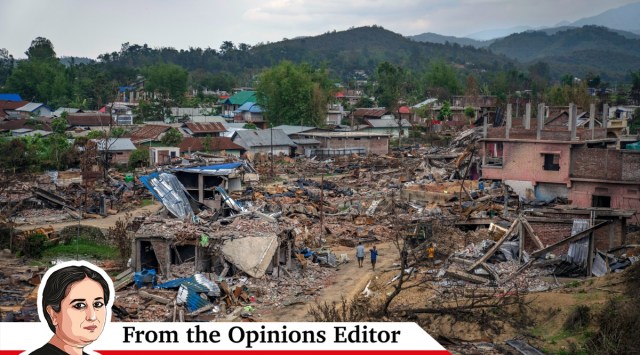
Dear Express reader,
It is often said that there are many Indias. Going by events in the news last week, you could see at least two countries, very different, and far away, from one another.
One in which Manipur continues to be a place of grim violence and pain, heartwrenching displacement and suffering, urgent in its tug on the nation’s attention and appeal to its empathies.
The 21-member multi-party delegation of MPs of the Opposition’s Indian National Developmental Inclusive Alliance (INDIA) alliance, in Manipur for a two-day visit, brought sobering stories of “sharp and stark divisions” on the ground, in the plains that have been emptied of Kukis and in the hills the Meiteis can no longer go to, and of festering despondency and anger in the relief camps. Women and children are the worst affected by a crisis that has gone on now for three months, and there is waning confidence in the fairness and firmness of the Biren Singh government in dealing with it. This is one India, Manipur has become its centre.
There is another India, in which Prime Minister Narendra Modi resides, and makes his speeches. Here, Manipur does not visibly intrude, or find mention — except once, when the PM spoke of the country’s shame after the video of the sexual assault on two women by a mob went viral, while clubbing it with incidents in Opposition-ruled states like Rajasthan and Chhattisgarh. That is, the PM spoke of Manipur while not speaking about Manipur alone.
Of course, home ministry officials have said that the PM has been constantly in touch with Union Home Minister Amit Shah, and has been monitoring the situation closely. Earlier, Shah visited Manipur for three and a half days, and this week he announced that the CBI would probe the sexual assault video, and the Centre will seek a trial outside Manipur, implicitly admitting that the Manipur administration has failed to provide a safe place for justice and resolution and the Centre needs to do something about that.
But after that one statement, the Prime Minister has stonewalled the Opposition’s demand that he speak on Manipur in the House — he has not even spoken on Manipur outside it — and the Opposition has now sought to force his hand by a no-confidence motion. The PM has not visited Manipur. He has been speaking, instead, of another India.
On July 26, Wednesday, the day the Opposition rallied behind a no-confidence motion against his government, the PM inaugurated the Bharat Mandapam at the capital’s Pragati Maidan, the venue for the G20 summit in September, and promised to make India the third largest economy in his yet-to-be-won third term. He painted a picture of a country unstoppable in its “vikas yatra (journey of progress)”. He listed his government’s development works, from the number of new airports to electrification of railways lines. India was now a place to “think big, dream big, act big”, the PM said.
The next day, on July 27, Thursday, the PM spoke of crimes against women in Sikar, and even gave a slogan for poll-bound Rajasthan “behen betiyon par atyachar nahin sahega Rajasthan”, but he did not speak of Manipur. He targeted the newly minted Opposition alliance INDIA, equating it with “enemies of the country”, and accused it of “embracing the tukde tukde gang”.
The same day, in Rajkot, Gujarat, the PM said a “neo-middle class” had emerged because of his government’s efforts at alleviation of poverty, and targeted the Opposition as naysayers again. Again, no Manipur.
On July 28, Friday, the PM inaugurated Semicon India-2023 in Gandhinagar, and pitched the country as a viable chip-making hub to global investors.
For sure, the India in the PM’s speeches is real too. The country of visible development showcased in Semicon India-2023 and the Bharat Mandapam, where government vs Opposition hostilities, as in Sikar and Rajkot, are revving up, ahead of what promises to be a hard fought election in 2024.
But in the PM’s India, going by both what he says and keeps silent on, Manipur does not need to be spoken of, and most importantly, in its time of crisis, spoken to. In this India, instead of an encompassing all-party delegation, a narrower group of Opposition MPs visited the relief camps of Manipur.
Ahead of 2024, the two Indias of last week are also a pointer to what lies ahead.
Clearly, PM Modi, as always, will not fight the battle on terms set by opponents or even events on the ground. He will seek, instead, to set the stage himself. He will be seen not as a PM beset with difficulties or crisis, but as the Leader with Big Ideas and a lengthening list of achievements and conquests. He will project his opponents as diminished figures and small men, embroiled in petty fights and brought low by corruption and nepotism, and narrow caste and regional interests. They, who only think of India in bits and pieces,“tukde tukde”.
As the Manipur crisis continues, the question for the PM is, can the northeastern state be a political turning point? Can it come in the way of his setting the narrative, arranging his stage and managing the light, so that it shows his most flattering profile?
And for the Opposition alliance, the question is: How do you enforce accountability, on Manipur as on other issues, from a PM who has, so far successfully, lifted himself above the messiness and failures on the ground? Who claims the space of Big Ideas and leaves the heavylifting of implementation, and the responsibility for the lack of it, to a host of sometimes faceless and mostly dispensable others?
Till next week,
Vandita
Must Read Opinions from the week:
– GN Devy, “Understanding award wapsi”, July 28
– Editorial, “Manipur Hour”, July 27
– Meeran Chadha Borwankar, “Failures of commission”, July 25